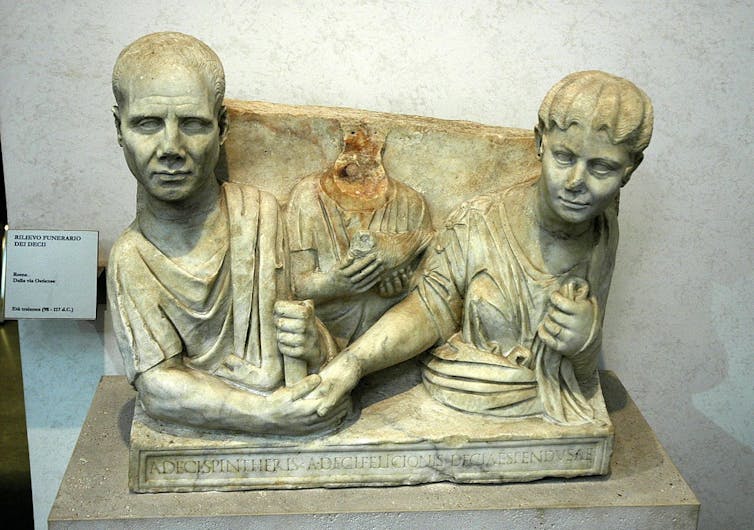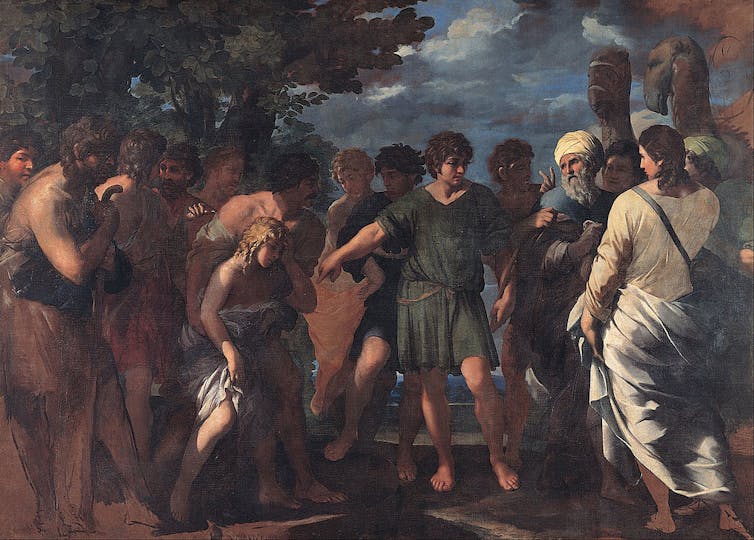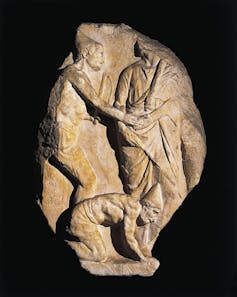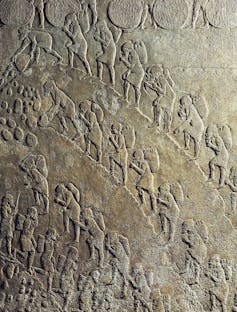
By Chance Bonar
As someone who researches slavery in the ancient Mediterranean world, especially in the Bible, I often hear remarks like, “Slavery was totally different back then, right?” “Well, it couldn’t have been that bad.” “Couldn’t slaves buy their freedom?”
Most people in the United States or Europe in the 21st century are more knowledgeable about the transatlantic slave trade, and live in societies deeply shaped by it. People can see the effects of modern enslavement everywhere from mass incarceration and housing segregation to voting habits.
The effects of ancient slavery, on the other hand, aren’t as tangible today – and most Americans have only a vague idea of what it looked like. Some people might think of biblical stories, such as Joseph’s jealous brothers selling him into slavery. Others might picture movies like “Spartacus,” or the myth that enslaved people built the Egyptian pyramids.
Because these kinds of slavery took place so long ago and weren’t based on modern racism, some people have the impression that they weren’t as harsh or violent. That impression makes room for public figures like Christian theologian and analytic philosopher William Lane Craig to argue that ancient slavery was actually beneficial for enslaved people.
Modern factors like capitalism and racist pseudoscience did shape the transatlantic slave trade in uniquely harrowing and enduring ways. Enslaved labor, for example, shaped economists’ theories about the “free market” and global trade.
But to understand slavery from that era – or to combat slavery today – we also need to understand the longer history of involuntary labor. As a scholar of ancient slavery and early Christian history, I often encounter three myths that stand in the way of understanding ancient slavery and how systems of enslavement have evolved over time.

Werner Forman/Universal Images Group via Getty Images
Myth #1: There is one kind of ‘biblical slavery’
The collection of texts that ended up in the Bible represent centuries of different writers from across the Mediterranean and Mesopotamia, often in very different circumstances, making it hard to generalize about how slavery worked in “biblical” societies. Most importantly, the Hebrew Bible – what Christians call “the Old Testament” – emerged primarily in the ancient Near East, while the New Testament emerged in the early Roman Empire.
Forms of enslavement and involuntary labor in the ancient Near East, for example – areas such as Egypt, Syria and Iran – were not always chattel slavery, in which enslaved people were considered property. Rather, some people were temporarily enslaved to pay off their debts.
However, this was not the case for all people enslaved in the ancient Near East, and certainly not under the late Roman Republic and early Roman Empire, where millions were trafficked and forced to labor in domestic, urban and agricultural settings.
Because of the range of periods and cultures involved in the production of biblical literature, there is no such thing as a single “biblical slavery.”

Fine Art Images/Heritage Images via Getty Images
Nor is there a single “biblical perspective” on slavery. The most anyone can say is that no biblical texts or writers explicitly condemn the institution of enslavement or the practice of chattel slavery. More robust challenges to slavery by Christians started to emerge in the fourth century C.E., in the writings of figures like St. Gregory of Nyssa, a theologian who lived in Cappadocia, in present-day Turkey.
Myth #2: Ancient slavery was not as cruel
Like Myth #1, this myth often comes from conflating some Near Eastern and Egyptian practices of involuntary labor, such as debt slavery, with Greek and Roman chattel slavery. By focusing on other forms of involuntary labor in specific ancient cultures, it is easy to overlook the widespread practice of chattel slavery and its harshness.

DEA/A. Dagli Orti/De Agostini via Getty Images
However, across the ancient Mediterranean, there is evidence of a variety of horrific practices: branding, whipping, bodily disfiguration, sexual assault, torture during legal trials, incarceration, crucifixion and more. In fact, a Latin inscription from Puteoli, an ancient city near Naples, Italy, recounts what enslavers could pay undertakers to whip or crucify enslaved people.
Christians were not exempt from participating in this cruelty. Archaeologists have found collars from Italy and North Africa that enslavers placed upon their enslaved people, offering a price for their return if they fled. Some of these collars bear Christian symbols like the chi-rho (☧), which combines the first two letters of Jesus’ name in Greek. One collar mentions that the enslaved person needs to be returned to their enslaver, “Felix the archdeacon.”
It’s difficult to apply contemporary moral standards to earlier eras, not least societies thousands of years ago. But even in an ancient world in which slavery was ever present, it is clear not everyone bought into the ideology of the elite enslavers. There are records of multiple slave rebellions in Greece and Italy – most famously, that of the escaped gladiator Spartacus.
Myth #3: Ancient slavery wasn’t discriminatory
Slavery in the ancient Mediterranean wasn’t based on race or skin color in the same way as the transatlantic slave trade, but this doesn’t mean ancient systems of enslavement weren’t discriminatory.

DeAgostini/Getty Images
Much of the history of Greek and Roman slavery involves enslaving people from other groups: Athenians enslaving non-Athenians, Spartans enslaving non-Spartans, Romans enslaving non-Romans. Often captured or defeated through warfare, such enslaved people were either forcibly migrated to a new area or were kept on their ancestral land and compelled to do farmwork or be domestic workers for their conquerors. Roman law required a slave’s “natio,” or place of origin, to be announced during auctions.
Ancient Mediterranean enslavers prioritized the purchase of people from different parts of the world on account of stereotypes about their various characteristics. Varro, a scholar who wrote about the management of agriculture, argued that an enslaver shouldn’t have too many enslaved people who were from the same nation or who could speak the same language, because they might organize and rebel.
Ancient slavery still depended on categorizing some groups of people as “others,” treating them as though they were wholly different from those who enslaved them.
The picture of slavery that most Americans are familiar with was deeply shaped by its time, particularly modern racism and capitalism. But other forms of slavery throughout human history were no less “real.” Understanding them and their causes may help challenge slavery today and in the future – especially at a time when some politicians are again claiming transatlantic slavery actually benefited enslaved people.
Chance Bonar, Postdoctoral Fellow, Center for the Humanities, Tufts University
This article is republished from The Conversation under a Creative Commons license. Read the original article.
![]()
Chance Bonar is a Postdoctoral Fellow at the Center for the Humanities, Tufts University.





























Pogo says
@Chance Bonar
A familiar song:
Bill C says
It is often said that Thomas Jefferson “treated his slaves well”.
From Smithsonian Magazine (oct. 2012): “And this world was crueler than we have been led to believe. A letter has recently come to light describing how Monticello’s young black boys, “the small ones,” age 10, 11 or 12, were whipped to get them to work in Jefferson’s nail factory, whose profits paid the mansion’s grocery bills. This passage about children being lashed had been suppressed—deliberately deleted from the published record in the 1953 edition of Jefferson’s Farm Book, containing 500 pages of plantation papers. That edition of the Farm Book still serves as a standard reference for research into the way Monticello worked.”
https://www.smithsonianmag.com/history/the-dark-side-of-thomas-jefferson-35976004/#:~:text=A%20letter%20has%20recently%20come,paid%20the%20mansion's%20grocery%20bills.
Skibum says
One can only wonder if any of those young slaves that were whipped and forced to work long hours in his plantation’s nail factory were his offspring that he sired with the intention of increasing the labor force, not to mention his profits. The beginnings of American capitalism were not what our history books would like us to believe.
Laurel says
We need to face the reality of the past, and the present. Slavery still exists.
We recently stayed at a nice hotel on Jax Beach, and there were two labels on our room door that explained about trafficking humans. We went to an upscale restaurant, and there was a man and woman, close to us, at the next table. It was supposed to be the woman’s birthday. The man sat back, ordered all the food and wine, and talked about nothing but himself. We both looked at the woman several times, who said nothing, and saw that she was clearly miserable. We both felt something was amiss. Were we wrong?
A few years back, I went into a liquor store in Orlando, and bought a bottle of bourbon. The lone employee, a woman, asked me for my id! Now I was around 66, and clearly looked over 21, and challenged her. She whispered “They’re watching me!” and slightly nodded at the camera over her head. She did not have that *it’s a job* look on her face, or in her tone, it was far more fearful. I was too thick at the time to get it. It still haunts me to this day.
Anyway, those are iffy situations, but looking back, I can see how control without shackles can be exercised over vulnerable people. They exist among us, often without our knowledge. Both adults and children are victims. They are every bit slaves.
Pogo says
@Laurel
Thank you. Very well said.
Sherry says
OMG! Laurel. . . you are WOKE. . . AKA “with an OPEN, still active, mind aware of what is going on around you and across our planet”. Good On You, Laurel!
My Buddhist teacher often refers to this “Wokeness” as being “Conscious”. Which is so contrary to the zombied, unthinking FOX “CULT” mentality that is unfortunately pervasive in the GOP. Instead of “AI”, my clever husband says cult members are suffering from “IA” = “Intelligence Altered”.
Bill C says
@Laurel IMO in all likelihood those people you mentioned were undocumented persons (i.e. “illegal immigrants”) afraid of being discovered and deported back to misery. They are taken advantage by the unscrupulous, and yes, they are vulnerable people “every bit slaves”.
Laurel says
Bill C.: The woman in the restaurant was a white woman, but since she never opened her mouth, I have no idea if there was another language or accent. Her whole demeanor was defeat. The man spoke English. The woman in the the liquor store had a Russian accent. Whether they were legal or not, I still feel for them.
Jim says
I’m amazed in the year 2023 that anyone would need to “dispel the myth of slavery”. I lived in Virginia and went to school in the ’60’s and I don’t remember anything good being said about slavery. I’m glad of that because there is nothing good to be said of slavery. And I’ll remind everyone that Virginia was a slave state and the capital of the Confederacy. As a child I was taught that slavery was terrible and I don’t think I’ve suffered any emotional or mental issues from learning those facts.
As for Florida’s current thoughts that slaves learned trades that were useful to them… Are you kidding me? If you are a slave and you die as a slave, how was any trade learned “useful” to the slave? This BS implies slaves worked a few years for the “master” and then got released into society and had to make it on their own. While some slaves were freed, most were not and lived as slaves for their entire life. That’s a fact and that’s what we should all be aware of when we think of those times. It should not be sugar coated so that some people won’t feel ashamed or embarrassed or whatever other stupid excuse offered.
Slavery was bad then, it’s bad now and it will always be bad. Education should present it in that context. To do so is the same as those among us who deny the holocaust. The mere fact of the horror of these things demands that we teach our next generation about them in the expectation that never will anyone even think of repeating these mistakes.
Again, in 2023, this should not even be an issue for discussion. Shame on Florida for going down this road.
Laurel says
Yeah, I think the DeSantis crowd, Mommies for Illiteracy, etc., think that somehow we should all become naive and that would solve all problems. Instead, it will make it so much easier for those who take advantage of the vulnerable. Bad move!